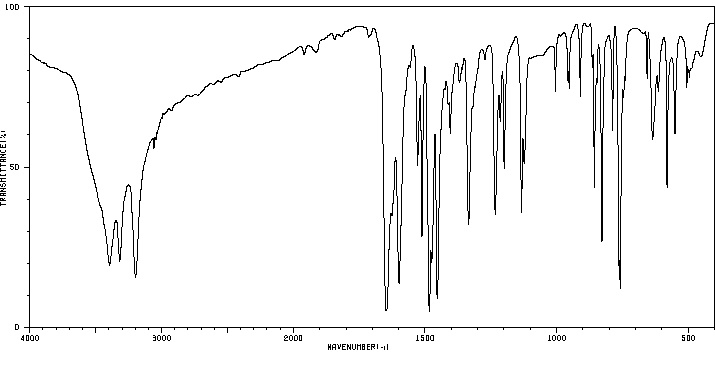2-氨基吩嗪 | 2876-23-5
中文名称
2-氨基吩嗪
中文别名
——
英文名称
phenazin-2-amine
英文别名
2-Aminophenazin;2-aminophenazine
CAS
2876-23-5
化学式
C12H9N3
mdl
MFCD00168265
分子量
195.224
InChiKey
RHQTYDDJBYBCQV-UHFFFAOYSA-N
BEILSTEIN
——
EINECS
——
-
物化性质
-
计算性质
-
ADMET
-
安全信息
-
SDS
-
制备方法与用途
-
上下游信息
-
文献信息
-
表征谱图
-
同类化合物
-
相关功能分类
-
相关结构分类
计算性质
-
辛醇/水分配系数(LogP):2.2
-
重原子数:15
-
可旋转键数:0
-
环数:3.0
-
sp3杂化的碳原子比例:0.0
-
拓扑面积:51.8
-
氢给体数:1
-
氢受体数:3
安全信息
-
海关编码:2933990090
SDS
上下游信息
-
上游原料
中文名称 英文名称 CAS号 化学式 分子量 2,3-二氨基吩嗪 2,3-diaminephenazine 655-86-7 C12H10N4 210.238 2-硝基吩嗪 2-nitrophenazine 3442-62-4 C12H7N3O2 225.206 —— 2-Aminophenazin-5,10-dioxid 26390-70-5 C12H9N3O2 227.222 —— ethyl phenazin-2-ylcarbamate —— C15H13N3O2 267.287 —— 2-nitrophenazine 10-oxide 2876-33-7 C12H7N3O3 241.206 -
下游产品
中文名称 英文名称 CAS号 化学式 分子量 —— N-(phenazin-2-yl)acetamide 28124-26-7 C14H11N3O 237.261 —— N-(phenazin-2-yl)propionamide 1491162-44-7 C15H13N3O 251.288 酚嗪 Phenazin 92-82-0 C12H8N2 180.209 —— 1,1-dimethyl-3-(phenazin-2-yl)urea 1491162-61-8 C15H14N4O 266.302 —— N-(phenazin-2-yl)butyramide 1491162-45-8 C16H15N3O 265.315 —— ethyl phenazin-2-ylcarbamate —— C15H13N3O2 267.287 —— 3-chloro-N-phenazin-2-ylpropanamide 1491162-59-4 C15H12ClN3O 285.733 —— 3-cyclopentyl-N-(phenazin-2-yl)propanamide 1491162-54-9 C20H21N3O 319.406 —— (2S)-2-amino-3-methyl-N-phenazin-2-ylbutanamide 78768-48-6 C17H18N4O 294.356 —— N-(phenazin-2-yl)benzamide 304644-21-1 C19H13N3O 299.332 —— N-(phenazin-2-yl)-2-phenylacetamide 1491162-46-9 C20H15N3O 313.359 —— N-(phenazin-2-yl)cyclohexanecarboxamide 1491162-53-8 C19H19N3O 305.379 —— (2S)-2-amino-4-methyl-N-phenazin-2-ylpentanamide 78768-49-7 C18H20N4O 308.383 —— 4-methyl-N-(phenazin-2-yl)benzamide 1491162-49-2 C20H15N3O 313.359 - 1
- 2
反应信息
-
作为反应物:参考文献:名称:In vitro anticancer activities of Schiff base and its lanthanum complex摘要:Schiff base metal complexes are well-known to intercalate DNA. The La(III) complexes have been synthesized such that they hinder with the role of the topoisomerases, which control the topology of DNA during the cell-division cycle. Although several promising chemotherapeutics have been developed, on the basis of Schiff base metal complex DNA intercalating system they did not proceed past clinical trials due to their dose-limiting toxicity. Herein, we discuss an alternative compound, the La(III) complex, [La(L-1)(2)Cl-3]center dot 7H(2)O based on a Schiff base ligand 2,3-dihydro-1H-indolo-[2,3-M-phenazin-4(5H)-ylidene)benzothiazole-2-amine (L-1), and report in vitro cell studies. Results of antitumor activity using cell viability assay, reactive oxygen species (ROS) generation and nuclear condensation in PC-3 (Human, prostate carcinoma) cells show that the metal complex is more potent than ligand. La(III) complexes have been synthesized by reaction of lanthanum(III) salt in 1:2 M ratio with ligands L-1 and 3-(ethoxymethylene)-2,3-dihydro-1H-indolo[2,3-b]-phenazin-4(5H)-ylidene)benzathiazole-2-amine (L-2) in methanol. The ligands and their La(III) complexes were characterized by molar conductance, magnetic susceptibility, elemental analyses, FT-IR, UV-Vis, H-1/C-13 NMR, thermogravimetric, XRD, and SEM analysis. (C) 2015 Elsevier BY. All rights reserved.DOI:10.1016/j.saa.2015.10.015
-
作为产物:描述:参考文献:名称:Ullmann, Justus Liebigs Annalen der Chemie, 1909, vol. 366, p. 89摘要:DOI:
文献信息
-
A Common, Facile and Eco-Friendly Method for the Reduction of Nitroarenes, Selective Reduction of Poly-Nitroarenes and Deoxygenation of <i>N</i> -Oxide Containing Heteroarenes Using Elemental Sulfur作者:Angel H. Romero、Hugo CerecettoDOI:10.1002/ejoc.202000064日期:2020.3.31A facile and convenient protocol for the reduction of nitro‐arenes and deoxygenation of heteroarenes N‐oxides under transition metal and additive free conditions has been developed. The strategy allows the selective reduction of poly‐nitroarenes as well as the efficient deoxygetaion of a variety of N‐oxides containing heteroarenes including benzofuroxanes and phenzines with a broad substrate scope
-
4-Piperidinecarboxamide modulators of vanilloid VR1 receptor申请人:Calvo R. Raul公开号:US20060116368A1公开(公告)日:2006-06-01This invention is directed to vanilloid receptor VR1 ligands. More particularly, this invention relates to hetero isonipecotic amides that are potent modulators of VR1 which are useful for the treatment and prevention of disease conditions in mammals.
-
Liposome composition for delivery of nucleic acid申请人:Alza Corporation公开号:US20030031704A1公开(公告)日:2003-02-13A liposome composition for delivery of a nucleic acid in vivo or ex vivo is described. The liposomes in the composition are comprised of (i) a lipid that is neutral in charge at physiologic pH and positively charged at pH values less than physiologic pH and (ii) a lipid joined to a hydrophilic polymer by a dithiobenzyl linkage. The liposomes are associated with a nucleic acid for delievery to a cell.
-
一种吩嗪类物质、其制备方法及其应用申请人:陆源公开号:CN106554321B公开(公告)日:2019-05-28本发明公开了一种新的吩嗪类物质、其制备方法及其应用。新的吩嗪类物质,为通式(1)所示的化合物或其医学上可接受的盐或其医学上可接受的盐的水合物,其中,n为0或1;X为‑NHCO‑或‑CONH‑;R为卤素或羟基;R1‑R3相同或不相同,各自独立的代表H、氨基、羟基、甲基、甲氧基或‑COOCH3;R4‑R7相同或不相同,各自独立的代表H、氨基、羟基、甲基、甲氧基、‑COOCH3、卤素、羧基或卤代甲基;通式(1)不包括当n为1,X为‑NHCO‑时,R2为羟基,R1、R3‑R7均为H的情况。本发明上述新的吩嗪类物质与现有的抗癌药物或其它现有的其它吩嗪类物质相比,具有更高的抗癌药活性、更小的毒性、更高的选择性。
-
作为TrxR1抑制剂的吩嗪衍生物、中间产物及其制备方法和用途
表征谱图
-
氢谱1HNMR
-
质谱MS
-
碳谱13CNMR
-
红外IR
-
拉曼Raman
-
峰位数据
-
峰位匹配
-
表征信息
同类化合物
(12羟基吲[2,1-b〕喹唑啉-6(12H)-酮)
黑暗猝灭剂BHQ-3,BHQ-3NHS
鸭嘴花酚碱
鸭嘴花碱酮;(S)-2,3-二氢-3,7-二羟基吡咯并[2,1-b]喹唑啉-9(1H)-酮
鸭嘴花碱酮
鸭嘴花碱盐酸盐
鲁米诺单钠盐
鲁米诺
骆驼蓬碱
颜料蓝64
颜料蓝60
顺式-卤夫酮
顺式-(喹喔啉-2-基)丙烯腈1,4-二氧化物
非奈利酮
青黛酮
雷替曲塞杂质1
阿法替尼杂质J
阿法替尼杂质I
阿法替尼杂质28
阿法替尼杂质18
阿法替尼杂质13
阿法替尼杂质
阿法替尼中间体
阿法替尼
阿法替尼
阿朴藏红
阿巴康唑
阿夫唑嗪杂质A
阿夫唑嗪杂质
阿夫唑嗪EP杂质C
阿夫唑嗪
阿喹司特
阿呋唑嗪杂质
阿呋唑嗪杂质
铜迈星
铁诱导细胞死亡激活剂
钠四丙基硼酸酯
酸性蓝98
酸性红101
酮色林醇
酞联氮基[2,3-b]酞嗪-5,14-二酮,7,12-二氢-
酞嗪-5-羧酸
酞嗪-2-氧化物
酚藏花红
酚嗪
酒石酸溴莫尼定
邻苯二甲酰肼
还原黄6GD
还原蓝6
达尼喹酮








